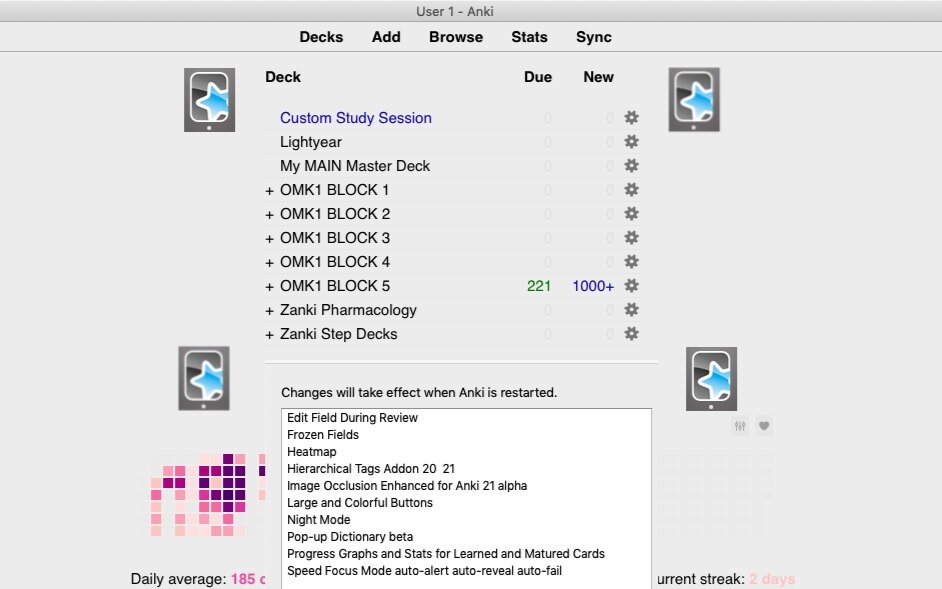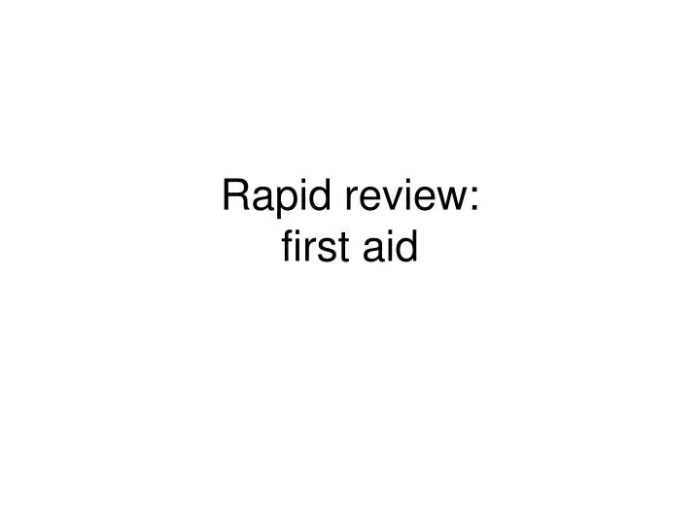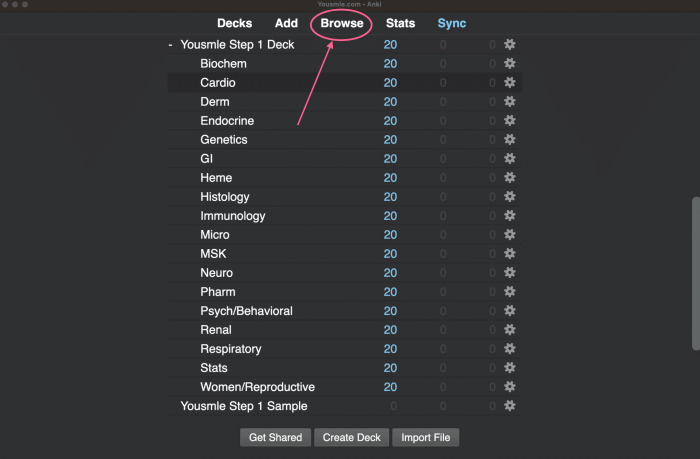Rapid Review First Aid Anki is a revolutionary study tool that has transformed the way medical students prepare for exams. This cutting-edge tool combines spaced repetition, active recall, and visual aids to create an incredibly effective memorization system.
In this comprehensive guide, we will explore the methods, benefits, and best practices of Rapid Review First Aid Anki. We will provide step-by-step instructions on how to create and use Anki flashcards, showcase examples of effective cards, and share success stories from students who have used Anki to achieve academic excellence.
Introduction to Rapid Review First Aid Anki

Rapid Review First Aid Anki is a flashcard system designed specifically for medical students and professionals who need to quickly and efficiently review first aid principles.
This deck of flashcards is based on the popular First Aid for the USMLE Step 1 textbook and covers a wide range of first aid topics, from basic life support to advanced trauma management. The cards are written in a clear and concise style, with high-yield information that is essential for success on the USMLE Step 1 exam and in clinical practice.
Benefits of Rapid Review First Aid Anki
- Helps students learn and retain information quickly and effectively.
- Provides a structured review of first aid principles.
- Can be used to supplement other study materials, such as textbooks and lectures.
- Is a portable and convenient way to study, making it easy to review material on the go.
- Can be customized to meet individual learning needs.
Methods and Procedures

Rapid Review First Aid Anki employs the principles of spaced repetition and active recall. Spaced repetition involves reviewing material at increasing intervals, which helps strengthen memories. Active recall requires you to actively retrieve information from memory, rather than passively reading it, which is more effective for long-term retention.
Creating Anki Flashcards
To create Anki flashcards, you can use the Anki software or the AnkiWeb online platform. Start by identifying the key concepts and information you want to memorize. Formulate your flashcards in a question-and-answer format, with the question on the front and the answer on the back.
Rapid review first aid Anki can be a lifesaver, especially when you’re short on time. It’s a great way to cram in a lot of information quickly. And if you’re looking for a fun way to learn, check out umd singing in the rain . It’s a great way to learn about first aid while having some fun.
And who knows, you might even make some new friends along the way. But don’t forget to come back to your rapid review first aid Anki flashcards. They’re the best way to make sure you remember everything you’ve learned.
Use concise language and avoid unnecessary details.
Using Anki Flashcards
Once you have created your flashcards, start reviewing them regularly. Anki uses an algorithm to determine the optimal intervals for review, based on your performance. As you correctly answer cards, the intervals between reviews will increase, while incorrect answers will lead to shorter intervals.
This helps you focus on the material you find more challenging.
Tips for Effective Memorization
*
-*Use active recall
Try to recall the answer to the question before looking at it. This forces your brain to work harder and strengthens the memory.
-
-*Review regularly
Consistency is key. Review your flashcards at the intervals recommended by Anki, even if you feel confident in your knowledge.
-*Spaced repetition
Gradually increase the intervals between reviews to improve long-term retention.
-*Use multiple decks
Organize your flashcards into different decks based on topic or difficulty. This helps you focus on specific areas and avoid overwhelming yourself.
-*Use images and diagrams
Visual aids can enhance memory and make learning more engaging.
-*Take breaks
Avoid studying for extended periods without taking breaks. Short breaks can help you stay focused and prevent burnout.
Examples and Use Cases: Rapid Review First Aid Anki
Anki is a powerful tool for preparing for medical exams like the USMLE and COMLEX. It can be used to create and review flashcards covering a wide range of topics, including anatomy, physiology, pathology, and pharmacology.
Sample Rapid Review First Aid Anki Cards
Here are a few examples of Rapid Review First Aid Anki cards:
- Front:What is the most common cause of acute pancreatitis? Back:Gallstones
- Front:What are the classic symptoms of appendicitis? Back:Right lower quadrant pain, nausea, vomiting, fever
- Front:What is the treatment for a tension pneumothorax? Back:Needle decompression or chest tube
Use Cases for Medical Exam Preparation, Rapid review first aid anki
Anki can be used to:
- Review high-yield material from First Aid for the USMLE
- Create custom decks covering specific topics or weak areas
- Test yourself on key concepts and identify areas for improvement
- Space out your reviews to optimize memory retention
Success Stories and Testimonials
Many medical students and residents have found success using Anki to prepare for their exams. Here are a few testimonials:
“Anki was a lifesaver for me during medical school. It helped me to learn and retain a huge amount of information in a short amount of time.”
“I used Anki to prepare for the COMLEX Level 1 and 2 exams. It was an invaluable tool that helped me to focus my studies and improve my scores.”
Comparisons and Alternatives
Anki is a versatile study tool that offers several advantages over traditional study methods. Compared to passive reading or note-taking, Anki actively engages learners by testing their recall at spaced intervals. This technique enhances memory retention and promotes long-term understanding.
Advantages of Anki
- Spaced Repetition:Anki’s algorithm ensures that cards are reviewed at optimal intervals, maximizing retention.
- Active Recall:Anki forces learners to actively recall information, strengthening neural connections.
- Customization:Anki allows users to tailor their decks to specific needs and learning styles.
- Tracking Progress:Anki provides detailed statistics on progress, enabling learners to monitor their improvement.
Disadvantages of Anki
- Time-Consuming:Creating and reviewing Anki decks can be time-consuming, especially for large volumes of material.
- Can Be Overwhelming:Anki’s extensive functionality can be overwhelming for some users.
- Reliance on User Input:The quality of Anki decks depends heavily on the accuracy and comprehensiveness of the user-generated content.
Alternative Resources and Techniques
While Anki is a powerful tool, it’s not the only option for medical review. Other resources and techniques include:
- Textbooks and Reference Books:Traditional textbooks and reference books provide comprehensive coverage of medical topics.
- Online Resources:Numerous websites and apps offer medical information, practice questions, and simulations.
- Flashcard Apps:Apps like Quizlet and Brainscape offer digital flashcards that can be customized and shared.
- Peer Study Groups:Collaborating with peers can enhance understanding and retention.
- Practice Questions:Solving practice questions tests knowledge and identifies areas for improvement.
The best study method depends on individual preferences and learning styles. It’s often beneficial to combine different resources and techniques to optimize learning outcomes.
Design and Organization
Rapid Review First Aid Anki employs a straightforward design to enhance memorization and recall. It follows a spaced repetition algorithm, ensuring cards are reviewed at optimal intervals based on your progress. This optimizes the learning process and minimizes forgetting.
To organize your flashcards effectively, categorize them into logical groups based on subject matter or concept. This allows for targeted review and retrieval when needed. Additionally, consider using tags to further refine your organization and enable quick filtering.
Card Efficiency and Recall
Optimizing card efficiency and recall involves several strategies. First, ensure your cards are concise and focused on a single concept. Avoid cluttering them with excessive information. Additionally, use visual cues, such as images or diagrams, to aid memory and understanding.
Regularly review your cards to reinforce retention. The spaced repetition algorithm will automatically schedule reviews, but you can also manually adjust intervals based on your recall success. Actively engage with the material by recalling information from memory, rather than simply recognizing it.
Illustrations and Visuals
Anki’s visual aids include images, diagrams, and charts. These visuals enhance memorization by providing a concrete representation of the concepts being studied.
For instance, medical concepts like anatomical structures can be illustrated with detailed diagrams. These diagrams can help students visualize the relationships between different parts of the body, making it easier to remember their functions and locations.
Example: Visual Aids for Medical Concepts
- Diagram of the Heart:Shows the chambers, valves, and blood flow patterns.
- Image of a CT Scan:Illustrates the cross-sectional anatomy of the brain.
- Chart of Drug Dosages:Provides a quick reference for appropriate medication administration.
Helpful Answers
What is Rapid Review First Aid Anki?
Rapid Review First Aid Anki is a software program that uses spaced repetition and active recall to help students memorize information.
How do I use Rapid Review First Aid Anki?
To use Rapid Review First Aid Anki, you will need to create a deck of flashcards containing the information you want to memorize. You will then review the flashcards at regular intervals, gradually increasing the time between reviews as you become more familiar with the material.
What are the benefits of using Rapid Review First Aid Anki?
Rapid Review First Aid Anki has been shown to be an effective way to improve memory and recall. It can help students learn more material in less time, and it can also help them retain information for longer periods of time.


